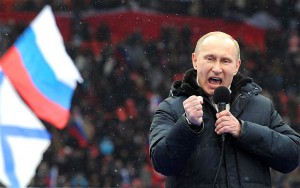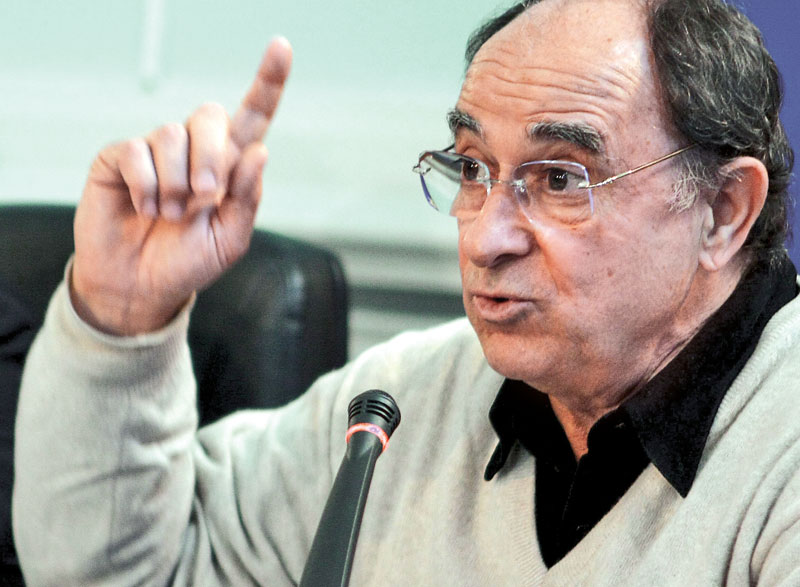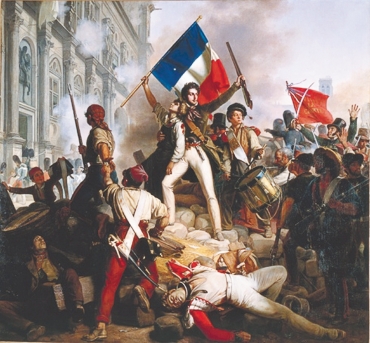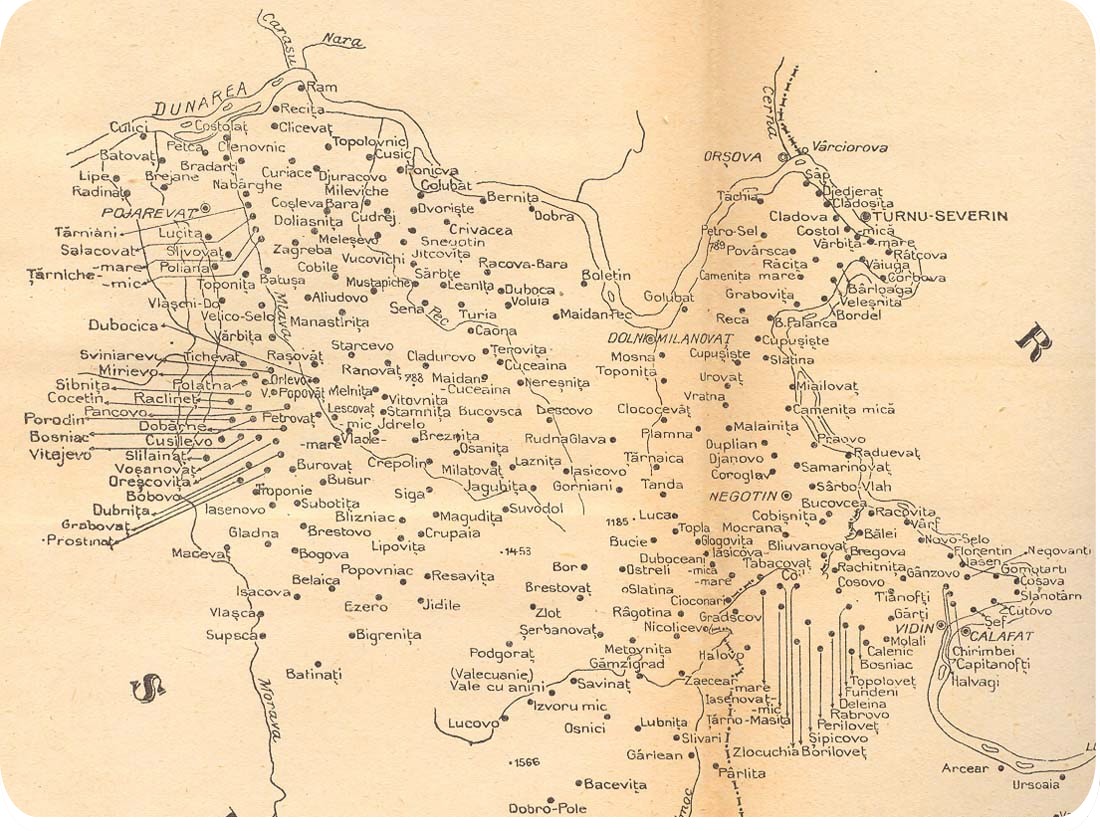Alexander Dugin
The following is excerpted from the book «Putin vs Putin: Vladimir Putin Viewed from the Right»:
 During his first term, President Putin desperately and persistently tried to hint at the agenda that he was going to propose to the nation. Many wanted him to speak out with more clarity and to be more concrete, but Putin’s style tends to be more general: he gives us an idea and leaves a lot of room for interpretation. But gradually, everything seemed to come together. The enigmatic Putin, silent, simultaneously frowning and smiling, finally let us know that his presidential programme would be defined by one simple word: conservatism.
During his first term, President Putin desperately and persistently tried to hint at the agenda that he was going to propose to the nation. Many wanted him to speak out with more clarity and to be more concrete, but Putin’s style tends to be more general: he gives us an idea and leaves a lot of room for interpretation. But gradually, everything seemed to come together. The enigmatic Putin, silent, simultaneously frowning and smiling, finally let us know that his presidential programme would be defined by one simple word: conservatism.
So, during his two terms Putin ruled in the vein of a ‘conservative programme’ and clearly intends to continue this policy into his third term. But what does ‘conservatism’ mean in modern Russia?
The Essence of Conservatism
Conservatism in its most general sense means a positive attitude towards historical tradition. It holds up the political and social history of a state as a role model, striving to preserve the continuity of the people’s national and cultural roots. The past is viewed by all denominations of conservatism as a positive phenomenon. Not everything in the past is perceived as positive, but a consistent conservative will never deliberately tarnish any period in the history of his people and state.
Moreover, conservatism is based on the premise that the people and the state have a certain historical mission, which can vary from universalist religious messianism to humble awareness of the importance of their national identity. The present, the past, and the future in the eyes of a conservative are tied together in a single integral project striving toward a clear national goal. In making any political or economic decision, a conservative always turns to the past and ponders the future. A conservative thinks in terms of landmarks and epochs, disregarding quick profit. His temporal, geographical, and value-related horizon is always broad.
A conservative is a dedicated bearer of national culture and seeks to comply with its norms. A conservative always over-exerts himself: from mandatory prayer to cold showers in the morning. A conservative consistently ranks duty, honour, the public benefit, loyalty to tradition, and his good reputation over comfort, benefit, profit, or popularity.
A conservative is reserved and prefers to speak prudently and thoughtfully.
A conservative is civil and always has an extra pair of glasses, even if he has perfect eyesight.
A conservative is unsettled by objective reality and carefully selects books for reading.
A conservative never considers himself as such.
A conservative smiles, turning up the corners of his mouth, and never expresses himself with his hands.
Anyone who does not comply with these requirements is not a proper conservative, he is just…
Fundamental Conservatism
Conservatism has an underlying philosophy. To be a conservative means to say ‘no’ to what we have now and to express one’s disagreement with the current state of things.
There is fundamental conservatism, which is called traditionalism.
Traditionalism is a form of conservatism that argues that everything is bad in its entirety in today’s world, not just in certain aspects. ‘The idea of progress, technical development, Descartes’ subject-object dualism, Newton’s watchmaker argument, contemporary positivistic science and the education based on it, pedagogics, and what we call modernism and postmodernism – they are all bad.’ A traditionalist likes only what had existed prior to modernism. In the twentieth century, when there seemed to be no social platform left for such conservatism, a constellation of thinkers and philosophers appeared out of nowhere and started to defend, radically and consistently, the traditionalist position: René Guénon, Julius Evola, Titus Burckhardt, Leopold Ziegler, and all those known as traditionalists. They proposed a programme of fundamental conservatism, described traditional society as a timeless ideal, and the contemporary world (modernism) and its basic principles as a product of decline, degradation, the mixing of castes, the disintegration of hierarchy, representing a shift of focus from the spiritual to the material, from Heaven to Earth, and from the eternal to the transient. Fundamental conservatives exist today in both the Orthodox and Catholic milieus. They completely reject modernism and believe that religious laws are absolutely relevant, and that the contemporary world and its values are an embodiment of the Antichrist, and which cannot offer anything good in the first place. These tendencies are common among Russian Old Believers. There is still a Paraclete Union in the Urals which does not use electric lighting because it is ‘the light of Lucifer’, and they use only pine splinters and candles; there are also sects which strictly prohibit coffee. When a group of young people in eighteenth-century Russia started to wear chequered trousers in accordance with the current fashions, the Fedosevans summoned an assembly in the town of Kimry, sometimes called the ‘trouser assembly’, and discussed whether those wearing chequered trousers should be excommunicated. Part of the assembly insisted that they be separated from the community and the other part voted against it.
The US has its own conservative tradition that is naturally based on the priorities of America’s national interests. Marked by a significant degree of messianism (‘the American civilisation is the peak of human history’), American conservatism respects the past and strives to preserve and strengthen the positions of its great country in the future. American conservatives profess loyalty to patriotic values as well as to religious, political, social and cultural norms that were established throughout the course of their historical development. This is natural and, as a consequence, American conservatism is flourishing: the US has achieved incredible power internationally, which makes its citizens justifiably proud and convinced of the righteousness of their ways. In America, fundamental conservatism is professed by a significant share of the Republican electorate, and TV programmes which feature Protestant fundamentalists criticising all things modern and postmodern and tearing them to shreds are watched by millions of people…
But the direct emulation of ‘Republican’ American conservatism by Russia yields absurd results: it turns out that what is to be ‘conserved’ are values that are not only foreign to historical and traditional Russia, but which are basically absent from contemporary Russian society.
Russia is an ancient land-based empire with a strong collectivist spirit, traditionally tough administrative rule and a very specific messianism. The US is a relatively new sea-based entity, intentionally designed as a laboratory experiment for the introduction of ‘progressivist’ bourgeois democratic principles that matured among ultra-Protestant sects. What is valued in the American civilisation is a sin and a disgrace for the Russians. What they respect is disgusting to us, and vice versa.
Russia was moving towards the East and the US was moving towards the West. Yes, they have won and we have lost. They proved to be stronger. But, according to our logic, God is not power, God is the truth. This is what a proper and consistent Russian conservatism says. Obviously, American conservatism says exactly the opposite.
Globalism can be both recognised and attacked in the US itself (this is their world domination project; some Americans agree with it and some do not). In Russia, globalism was imposed on us from the outside. We can put up with it and recognise our defeat, and join the American value system. This position is possible, as is collaborationism. But it would be the opposite of conservatism.
All peoples have their own conservatism because each nation develops its own value system, and this constitutes its national identity. The cultural outcome of American history does not have anything in common with the cultural outcome of Russian history. A conservative is always loyal to his traditions, his people and his ideals – not only in their heyday, but also when they are desecrated and despised by all.
The Conservative Choice
Contemporary Russian conservatism must be simultaneously non-Communist (the Communist dogma has always denied the fact that the Soviet regime was a continuation of tsarism and treated recent democratic reforms in an extremely negative light), non-liberal (liberalism is too revolutionary and insists on a radical break from both the Soviet past and the tsarist legacy), and non-monarchic (monarchism wants to exclude both the Soviet and the recent liberal democratic periods from national history).
The peculiarity of Russian political life in the twenty-first century is that its main stages have been in direct and severe conceptual opposition to each other and succeeded each other not through natural continuity, but through revolutions and radical disruptions. This seriously challenges the formula of contemporary Russian conservatism: the continuity and identity of Russia and the Russian people are not plainly visible on society’s surface; in order to establish consistent conservative views, one must make an effort that will raise us to the level of a new historical, political, civilisational, and national consolidation. Contemporary Russian conservatism is not a given, but a task to be undertaken.
Consistent Russian conservatism must combine the historical and geographical layers of our national existence. I would like to remind you that, during the very first years of Soviet rule, the Eurasianists insisted on the civilisational continuity of the USSR in relation to the Russian Empire.
Contemplating contemporary Russian conservatism is basically contemplating Eurasianism, which is a synthesis of Russian political history on the basis of a unique geopolitical and civilisational methodology. Russia, viewed as Eurasia, reveals its permanent essence and its historical identity – from the mosaic of Slavic, Turkic and Ugrian tribes through Kievan Rus’ and Muscovy to the great continental empire, first ‘white’ and then ‘red’, to today’s democratic Russia, which is a little indecisive but is now pulling herself together for a new historical leap.
I am convinced that political history will very soon force us clarify our positions and polish our rhetoric to make it more precise. We have no choice but conservatism: we will be pushed towards it from the outside, as well as from within. But what shall we do with the spirit of revolution, the will, the blazing flame of rebellion which secretly languishes in the Russian heart and disturbs our sleep, inviting us to follow it to faraway lands? I think that we should invest our continental strength in a new conservative project. And let it be the new edition of our Revolution, the Conservative Revolution, the National Revolution in the name of a big dream…
Putin and Conservatism
The basic paradigm of Putin and his supporters is, I think, a universal conservatism, which includes everything from the liberally enlightened to the social and fundamental forms of conservatism. The alternatives are liberalism and Atlanticism, which have been held over from earlier times in the form of some of the personnel among the presidential administration and its experts and advisors. Putin is personally a supporter of the idea of economic and social mobilisation for the sake of strengthening Russia’s national sovereignty.
It can be referred to as ‘active conservatism’, ‘radical conservatism’, and even a call for a conservative revolution. Putin would like to give conservatism some consistency and political resilience. This movement is noticeably slowing down due to the unwillingness and passive attitude of state officials, centrist parties, and possibly even the masses; the policy is dampened by an entourage that blunts its vector. There is no intellectually concentrated focus, no adequate institutions, and no political instruments capable of undertaking it. This is the reason many of Putin’s speeches are passively conservative, hinting only at achieving satisfaction and preserving the status quo. This is the principal contradiction of Putin and his rule: subjectively Putin realises and recognises the need for active conservative measures to drag the country out of stagnation, but he cannot properly implement such measures. There is ongoing passive sabotage of Putin’s initiatives by members of the President’s closest entourage.
The second source of resistance is the oligarchs. They do not see the necessity of strengthening the national administration and are quite satisfied with the status quo. They are only interested either in subduing conservatism, stripping it of ideology and deconstructing it (Pyotr Aven and Alfa-Bank), or in a gradual transition to liberalism.
The third source is the diehard liberals. They are few and their paladin is Anatoly Chubais, whose primary focus is the economy and administration rather than ideology. That said, Chubais does not, in fact, disagree with the official course; he merely ignores it in a friendly manner, remaining loyal to the authorities.
But one cannot rule out the possibility of a repeat privatisation of major holdings, such as that which was carried out in the 1990s. This re-privatisation phenomenon is practiced by many capitalist countries, where the role of the state and the administrative institutions in the acquisition of property is very significant. The bureaucracy rotates and new greedy civil servants appear, who were once corrupted and are now begging for more, and the owners think that they have already paid in full. The conditions for a re-privatisation in Russia are maturing. Legally it can be arranged in any way necessary and it can be accomplished politically as an intermediate stage of re-nationalisation stage or disguised as patriotism.
Again: Who are You, Mr Putin?
This question, posed at the beginning of Putin’s career, was formulated during the transmutation of contemporary Russia’s political language from modernism into postmodernism. The classical modernism of the Enlightenment views Putin more as a human being, a personality with particular features, and less as a politician. In postmodernism, a personality is an empty spot – fragments of a discourse in a linguistic context. Vladimir Putin’s image stems not from knowledge of him or from an analysis of his actions, but from language games.
When people who know our President well hear what is said about Putin in the West, they fall out of their chairs. This happens because the Putin the West has imagined does not exist. There are reports and language games about Putin being created in both Russia and Europe, and the ugly picture that the West is given of him has nothing at all to do with our President. Westerners sees Putin as a ‘political dwarf ’ without any ideology, a protégé of the most reactionary circles and of the most horrible secret services; a person neither with any political future nor any respect for democracy. We, on the other hand, deal with another Putin. He is a product of our ceremonial, mostly officious style.
Putin does not exist merely as a person. […] [T]he building of the Eurasian Empire [will take place] with Putin as an instrument of its creation. Whether or not Putin was chosen in the secret corridors of the Russian secret service to implement this empire-building feat remains a mystery. This cannot be either refuted or confirmed. The ‘Vladimir Putin and the Eurasian Empire’ project is not just the past, the present, and the future. A visionary acts in a space where the past and future coexist.
What Putin and his entourage think about this surprising and attractive image of a historical person is less important than the way we understand the essence and contexts of the imperial project within which such transformations are possible. As the German Romantic Novalis once said, we learn more about the essence of ancient times from fairy tales than from detailed historical chronicles. Only totally inept and mentally deficient people, like the early Ludwig Wittgenstein or the positivists, can argue that a researcher needs atomic facts. There are no such facts: they have been searched for by people more dedicated than these contemporary Russian philistines, indeed by piercing and acute minds. Putin as an actual person simply does not exist, and the version proposed by Jean Parvulesco deserves serious contemplation because intellectually, stylistically and visually it revolves around the very metaphysics of our Large Space and our great people. This is why ‘Putin as the builder of the great Eurasian empire’ is the most correct and realistic understanding of his mission, while all the junk that is churned out both against him and in his support will soon rot away. Putin as the empire-builder will survive, even if he himself rejects this image. He will still constitute the portrait of our epoch, not only of Putin himself but of Russia. The Eurasian Empire is inevitably integrated in the dogmatic course of things. This is understood by Robert Gates and Geoffrey Hosking, as well as by the entire Western elite that rules the contemporary world. The Eurasian Empire was, is and always will be, and Putin is obviously connected with it.


























































